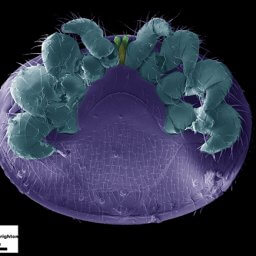
In February 2018, the European Food Safety Authority (EFSA) confirmed that the pesticide group of neonicotinoids is harmful to bees. A novel pesticide manufactured by Bayer AG is therefore being discussed as an alternative; it contains flupyradifurone from the class of butenolides. The product goes by the brand name of Sivanto.
Sivanto is assumed to be effective against various sucking insects …

Lack of information on the effects of all pesticide ingredients makes them appear safer than they are — potentially causing serious harm to people and the environment.
New regulations are needed to protect people and the environment from toxic pesticide ingredients that are not currently subject to safety assessments. This is the conclusion of the first comprehensive review of gaps in …

The magnified photographs of the pinhead-sized mite, aptly named Varroa destructor, were captured by Dr. Jonathan Salvage of the University of Brighton (UK), using a state-of-the-art scanning electron microscope (SEM).
Dr. Salvage, a Research Fellow in the University’s School of Pharmacy and Biomolecular Sciences, has been working with Adam Leitch, a Master Beekeeper, on both a study of plant pollen that …

Good nutrition can help us ward off illness. But what happens when we’re already sick? In honey bees, sick bees appear to make smarter nutritional choices. A new study compared the feeding habits of healthy bees to those infected with the gut parasite Nosema ceranae.
In the study, published recently in the journal Microbial Ecology, the researchers first gave groups of …

When given the choice, honey bee foragers prefer to collect sugar syrup laced with the fungicide chlorothalonil over sugar syrup alone, researchers report in the journal Scientific Reports.
The puzzling finding comes on the heels of other studies linking fungicides to declines in honey bee and wild bee populations. One recent study, for example, found parallels between the use of chlorothalonil …

The combined effects of pesticides and a lack of nutrition form a deadly one-two punch, new research from biologists at the University of California San Diego has shown for the first time.
In a study published Dec. 20 in Proceedings of the Royal Society B, Simone Tosi, James Nieh and their colleagues used honey bees due to their important role as …

The honey bee gut is colonized by specialized bacteria that help digest components of the floral pollen diet and produce molecules that likely promote bee health. In a recent study published in PLOS Biology, a group of researchers from Switzerland uncovered which bacterial species perform which specific digestive functions in the bee gut.
The authors measured the repertoire of simple chemical …

by the Wildlife Conservation Society
Humans have transformed the landscape to an amazing degree. We are losing our wild places, where much biodiversity of insects still awaits undiscovered. Many species of bees live in these untouched areas, pollinating a great diversity of plants. A new study shows how much of our wilderness areas we have lost since 1993.
These maps of our …







